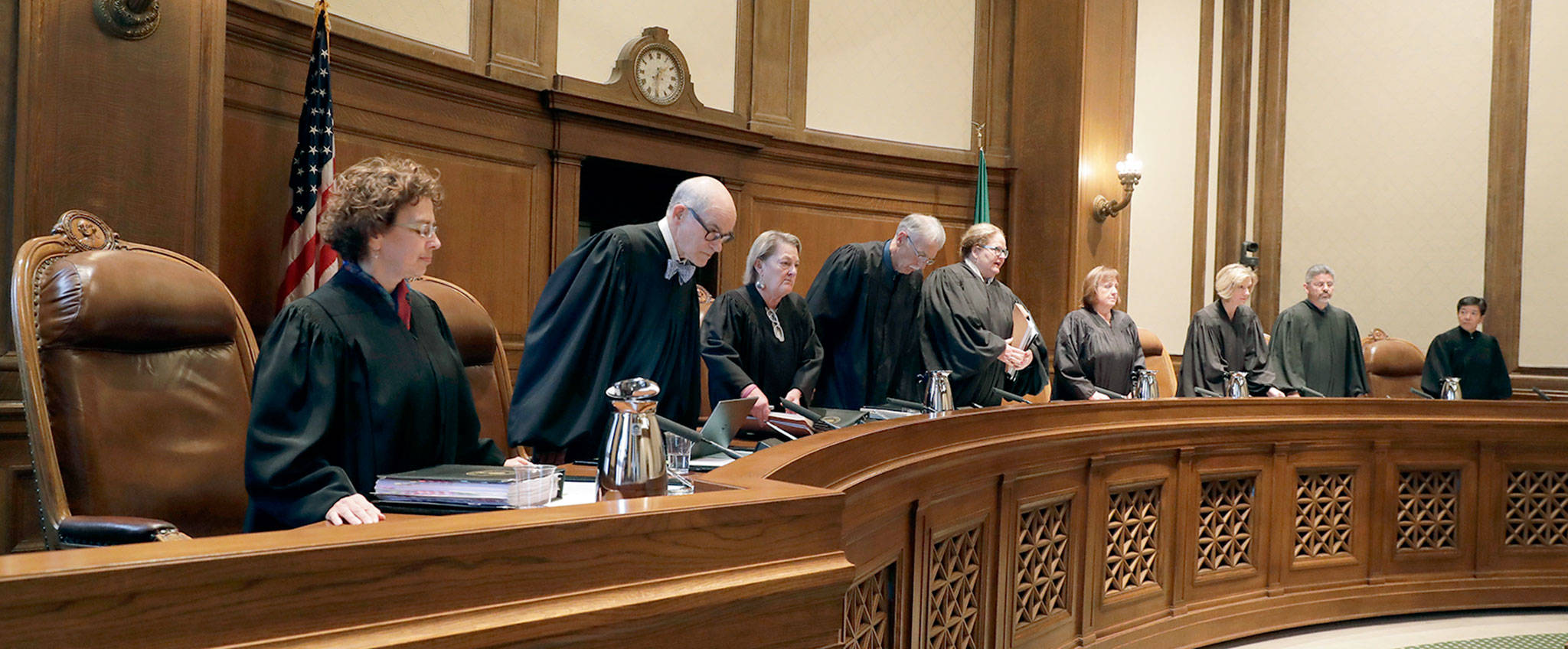By Gene Johnson / Associated Press
SEATTLE — The question of whether Washington voters will have their say on a measure designed to make it easier to prosecute police for negligent shootings might not be over after all.
One day after ruling that Initiative 940 should appear on the November ballot, the state Supreme Court requested a briefing by the end of the day Wednesday about how the justices’ various opinions should be interpreted.
Supporters of the initiative said only a single justice, Barbara Madsen, voted that I-940 should go to voters while a compromise measure preferred by lawmakers, advocates and police groups should not. Supporters of I-940 said her opinion should not control the result of what amounted to a 4-4-1 decision, and late Tuesday they filed an emergency motion asking the court to reconsider.
“For reasons not explained, the Court seems to have adopted the view of that single Justice as the ruling of the Court as a whole,” attorneys for De-Escalate Washington, the initiative’s sponsor, wrote.
In their response Wednesday afternoon, frequent initiative sponsor Tim Eyman and Republican Sen. Mike Padden, who sued over the issue, said the court’s action was appropriate because five justices believed I-940 should go to the ballot.
Secretary of State Kim Wyman also filed a response, taking no position on the outcome of the case but urging the court to hurry. Because of the reconsideration motion, her office had to halt certain election preparations, including notifying counties which initiatives would appear on their ballots.
“The Secretary of State and county election officials need to receive this Court’s resolution of this case as soon as possible in order to print and mail ballots and voters’ pamphlets to military and overseas voters by the statutory deadline of 45 days before Election Day,” her response said.
De-Escalate Washington submitted I-940 to the Legislature early this year after collecting nearly 360,000 signatures. The measure is designed to improve police training in de-escalation tactics and to eliminate a requirement that prosecutors prove officers acted with malice to get a conviction in negligent shootings.
Law enforcement groups objected to some of the initiative’s provisions, however, and both sides came together with lawmakers to craft a compromise. The Legislature then passed the original as well as a bill to amend and replace it with the compromise language.
That was unprecedented. Under the state Constitution, lawmakers can approve such initiatives as written; reject or ignore them, in which case they appear on the November ballot; or propose an alternative to appear alongside the original on the ballot.
The Legislature’s maneuver amounted to a fourth option not considered by the Constitution.
None of the justices said the compromise could stand as law. The debate among them was whether the original measure would take effect as passed; whether it alone would go to the voters; or whether it and the compromise would go to the voters.
Four justices — Sheryl Gordon McCloud, Charles Wiggins, Steven Gonzalez and Mary Yu — said the compromise amendment was invalid, but the original initiative should take effect without a public vote, because the Legislature passed it.
Four other justices — Mary Fairhurst, Debra Stephens, Charles Johnson and Susan Owens — said both measures should be placed on the ballot, because the compromise amounted to an alternative proposed by the Legislature.
And then there was Madsen, who said she would have sent both measures to the ballot, except that the compromise measure contained a provision rendering it invalid if the original measure was subject to referendum. Thus, she decided, only the original initiative should go to a public vote.
De-Escalate Washington told the court it seemed wrong to put only I-940 on the ballot when eight of the nine justices had not endorsed that result. It urged the court to let I-940 take effect as passed. Alternatively, it said, the court could place both on the ballot — a result that Eyman and Padden had been seeking all along.
Eyman and Padden’s brief argued that the initiative’s supporters were not entitled to reconsideration because they failed to show the court made a mistake.
“The Court’s opinion … reflected a sharp division of opinion among the members of the Court,” their attorneys wrote. “Nonetheless, it thoroughly addressed all of the arguments presented by the parties.”
Talk to us
> Give us your news tips.
> Send us a letter to the editor.
> More Herald contact information.

























